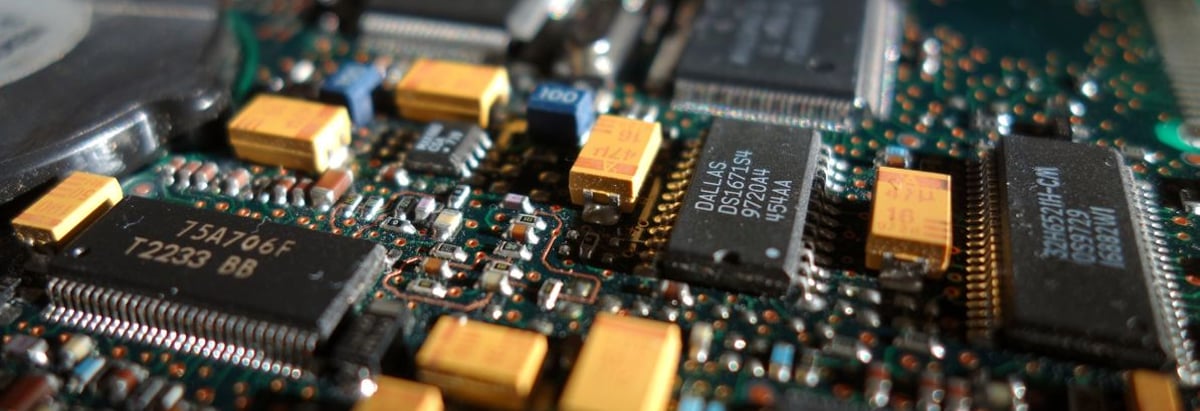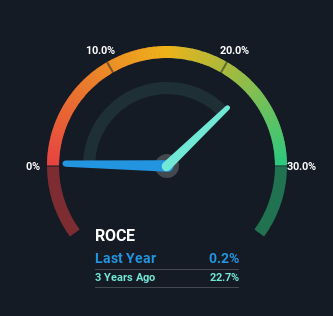- China
- /
- Semiconductors
- /
- SHSE:688261
There Are Reasons To Feel Uneasy About Suzhou Oriental Semiconductor's (SHSE:688261) Returns On Capital

Did you know there are some financial metrics that can provide clues of a potential multi-bagger? Ideally, a business will show two trends; firstly a growing return on capital employed (ROCE) and secondly, an increasing amount of capital employed. This shows us that it's a compounding machine, able to continually reinvest its earnings back into the business and generate higher returns. Although, when we looked at Suzhou Oriental Semiconductor (SHSE:688261), it didn't seem to tick all of these boxes.
What Is Return On Capital Employed (ROCE)?
Just to clarify if you're unsure, ROCE is a metric for evaluating how much pre-tax income (in percentage terms) a company earns on the capital invested in its business. Analysts use this formula to calculate it for Suzhou Oriental Semiconductor:
Return on Capital Employed = Earnings Before Interest and Tax (EBIT) ÷ (Total Assets - Current Liabilities)
0.0022 = CN¥6.4m ÷ (CN¥3.0b - CN¥130m) (Based on the trailing twelve months to September 2024).
So, Suzhou Oriental Semiconductor has an ROCE of 0.2%. In absolute terms, that's a low return and it also under-performs the Semiconductor industry average of 4.4%.
Check out our latest analysis for Suzhou Oriental Semiconductor

Above you can see how the current ROCE for Suzhou Oriental Semiconductor compares to its prior returns on capital, but there's only so much you can tell from the past. If you'd like, you can check out the forecasts from the analysts covering Suzhou Oriental Semiconductor for free.
What Can We Tell From Suzhou Oriental Semiconductor's ROCE Trend?
On the surface, the trend of ROCE at Suzhou Oriental Semiconductor doesn't inspire confidence. Around five years ago the returns on capital were 4.2%, but since then they've fallen to 0.2%. And considering revenue has dropped while employing more capital, we'd be cautious. This could mean that the business is losing its competitive advantage or market share, because while more money is being put into ventures, it's actually producing a lower return - "less bang for their buck" per se.
Our Take On Suzhou Oriental Semiconductor's ROCE
From the above analysis, we find it rather worrisome that returns on capital and sales for Suzhou Oriental Semiconductor have fallen, meanwhile the business is employing more capital than it was five years ago. It should come as no surprise then that the stock has fallen 26% over the last year, so it looks like investors are recognizing these changes. That being the case, unless the underlying trends revert to a more positive trajectory, we'd consider looking elsewhere.
Since virtually every company faces some risks, it's worth knowing what they are, and we've spotted 2 warning signs for Suzhou Oriental Semiconductor (of which 1 shouldn't be ignored!) that you should know about.
While Suzhou Oriental Semiconductor isn't earning the highest return, check out this free list of companies that are earning high returns on equity with solid balance sheets.
New: Manage All Your Stock Portfolios in One Place
We've created the ultimate portfolio companion for stock investors, and it's free.
• Connect an unlimited number of Portfolios and see your total in one currency
• Be alerted to new Warning Signs or Risks via email or mobile
• Track the Fair Value of your stocks
Have feedback on this article? Concerned about the content? Get in touch with us directly. Alternatively, email editorial-team (at) simplywallst.com.
This article by Simply Wall St is general in nature. We provide commentary based on historical data and analyst forecasts only using an unbiased methodology and our articles are not intended to be financial advice. It does not constitute a recommendation to buy or sell any stock, and does not take account of your objectives, or your financial situation. We aim to bring you long-term focused analysis driven by fundamental data. Note that our analysis may not factor in the latest price-sensitive company announcements or qualitative material. Simply Wall St has no position in any stocks mentioned.
About SHSE:688261
Suzhou Oriental Semiconductor
Operates as a semiconductor technology company in China.
Reasonable growth potential with adequate balance sheet.
Market Insights
Community Narratives



